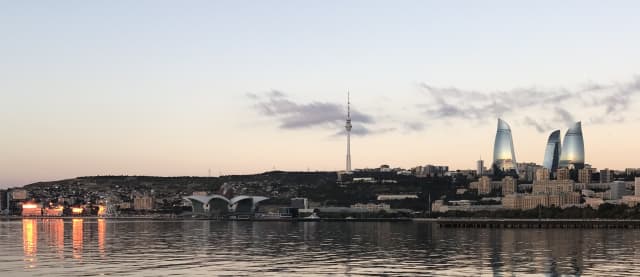A part of Baku is so old, and you can see that so clearly when you are out and about on the seaside promenade as the sun comes up, the Old City with its walls dating to — it’s believed — the 12th century.
But Baku is so new, too, its ambition, its standing in the world already and its direction, and this is what really stands out, the beautiful new buildings, the construction cranes seemingly everywhere and, most of all, the sure and thoughtful urban planning that went into this city by the bay.
Baku is, in this sense, like Chicago. There, the city was rebuilt after a destructive 19th-century fire. The few blocks along the Lake Michigan shoreline were deliberately left for public space — made into a series of great parks accented by promenades. The idea was to let the city breathe and, moreover, to deliberately leave room for people to feel their humanity, to connect to the natural world by the waterside.
Daniel Burnham, the architect and urban planner now famously connected to Chicago’s design, once said, “Make no small plans. They have no magic to stir men’s blood.”
The same for Baku.
Along Baku Bay, where the city meets the Caspian Sea, the first few blocks inland are all green — several kilometers worth, as the bay makes a fishhook-like curve along the shoreline.
From the National Flag Complex and Crystal Hall at one end, passing the Baku Ferris Wheel and other points of note, all the way up to the Boulevard Hotel at the other — it’s all green, park and promenade.
And even — especially — at sunrise, it is where the city turns each day to renewed life.
Here on an enormous pole flutters a huge Azerbaijani flag — blue, red and green, with a white crescent and an eight-pointed star in the center. This flag is so big it matches those enormous red, white and blue proclamations you might see at a truck stop along an American interstate highway. In case anyone missed the message: they love their country here, independent since 1991.
Here, on the steps of the Port Hotel, are a clutch of young lovers. What to do? The night is over. Sigh.
Down a few steps, in his red uniform, is the garbage man, sweeping away — why is unclear, because the promenade is already spotless. You can run the length of the promenade (I did), and slowly (it happens when you get to a certain age), and not see any litter. None. In case the message was not clear: there is great pride, too, in living here.
There are other joggers. Men and women. Everyone nods hello in passing to everyone else. This is a predominantly Muslim country, yes, but the women are comfortable jogging in sleeveless T-shirts and in Lululemon-style tights. There clearly is money here — about halfway along the promenade, across the street, there’s the high-end Port Baku shopping mall with Givenchy, Giorgio Armani, Jimmy Choo and more.
Any number of older women are out walking with ski poles, as if readying for an expedition up Kilimanjaro.
The kiosks, with their Coca-Cola signs and popcorn advertisements, are not open yet. But a few cafés are, with the regulars at their appointed seats. It’s too early for lively discussion. Just coffee, please. Just the sense of being alive, by the sea. This alone — for a quiet moment or two, it’s enough.
The sun shines a brilliant red, for just a few moments. And then, so quickly, it shades to yellow, rising in the sky.
The ferry boats start to chug.
The traffic starts to build.
Here is a city that is a place of its own. It does not need to be like anywhere else to be measured as one of the rising capitals of the world.
They know that here.
In the quiet light of dawn, it’s obvious.
Alan Abrahamson is an award-winning sportswriter, best-selling author and in-demand television analyst. In 2010 he launched his own website, 3 Wire Sports (www.3wiresports.com). From 2006 until 2010, Alan served as columnist at NBCOlympics.com, NBCSports.com and UniversalSports.com. For the 17 years before that, he was a staff writer at the Los Angeles Times; he spent his first nine years at the newspaper covering news and the final eight sports, mostly the Olympic movement. The 2016 Rio Games marked his ninth Olympics, Summer and Winter; he is a member of the International Olympic Committee's press committee.




